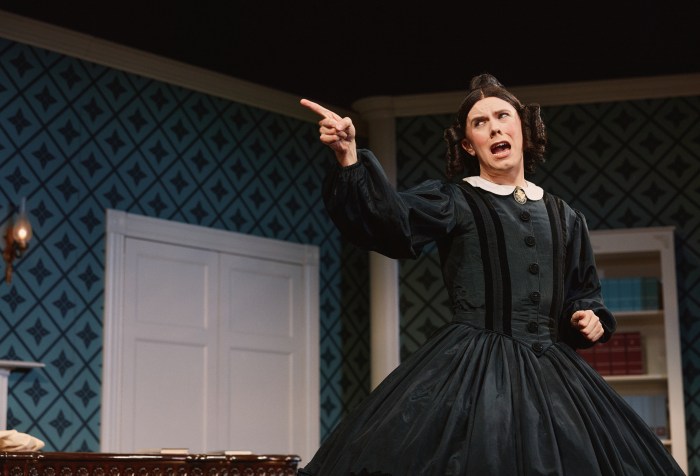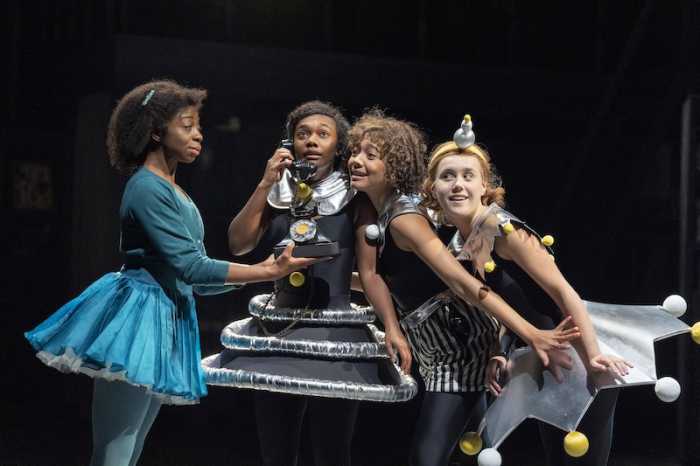The best theatrical silliness is defined by flawless technique, clockwork timing, and an intelligence that suffuses the entire operation. In the face of masterful work, an audience can simply let go and enjoy the ride.
Plautus in ancient Rome, Shakespeare in Elizabethan England, and more recently Charles Busch and Charles Ludlum knew and exploited this to the great and enduring delight of their audiences.
Now comes Cole Escola and their over-the-top, brilliantly ridiculous and relentlessly ribald play “Oh, Mary!” It is the highlight of Broadway this summer, and you miss it at your peril. The show was a hit downtown earlier this year, and in moving to Broadway it’s become bigger, louder, and even more outrageous — all to the good.
Escola has imagined a topsy-turvy history in which Mary Todd Lincoln is a frustrated cabaret chanteuse known for her “madcap medlys.” Her husband is failing, with no success, to suppress his homosexual urges, and while the country is at war somewhere in the background, it’s the ongoing domestic donnybrook that drives the action of the play. Mary is also an alcoholic of the riotously destructive and angry variety, and her frustration at being barred from the wicked stage by her husband’s belief it’s inappropriate is taken out on everyone around her. She battles her husband relentlessly and is outlandishly cruel to her companion Louise. (“Why would I push her down the stairs? Because it’s hilarious?” she asks.) Later she coaxes a personal secret out of Louise only to use it to humiliate her loyal companion later.
All of this is ample fodder for barbs and brawls, but there’s also an underlying brilliance to the piece that is as awe-inducing as the hilarity. Escola uses the real Mary Todd Lincoln’s well-documented extreme behavior, later presumed to be bipolar disorder, as the catalyst for crazy, and this Mary is completely self-involved (In response to her husband’s concerns about the war with the South, she asks several times, “The south of what?”) and deliciously bonkers. The feral ferocity and magnificent mood swings keep the audience on the edge of their seats and laughing uproariously at the over-the-top absurdity.
Escola is a comic genius with flawless timing and spectacular physicality. For most of the play, they are in a capacious hoop skirt that threatens to level everything in their path, and they use it like a wrecking ball. Under a wig of “bratty curls,” Escola’s moods range from an evil twinkle in the eye to unhinged rage and pretty much everything in between — all done with absolute control, which ensures every comic nuance lands spectacularly.

As Mary’s Husband (That’s how he’s listed.), Conrad Ricamora is crazed and tormented. Yes, the Civil War weighs on his mind, but he’s got other problems. He has to deal with his manic wife as well as his own gay urges, and the plot twists and turns as much as his torment.
To keep Mary off the stage, her husband hires an acting coach, and that plot goes off the rails as well. James Scully is terrific in the role as the handsome comic foil with a dark secret. Bianca Leigh is sensational as Louise, and Tony Macht is endearing, and not without his own touch of shade, as Mary’s Husband’s Assistant. (The cast list, like the show, is all about Mary.)
The brilliance doesn’t stop with the cast, however. Director Sam Pinkleton is a master of camp and comedy. His eclectic directorial style recalls everything from 19th Century melodrama, complete with conventional attitudes of the time, to classic farce, to Carol Burnett-style physical comedy to the winking, audience-directed commentary of Busch and Ludlam. Pinkleton throws all the tropes and history into the pot and brews up something distinctly his own. At one point, Ricamora is in full melodrama mode, including the once-codified hand gestures for supplication and calling on heaven — only to have that pleading mean something else far more earthly.
Beyond comedy, one of the important elements of this kind of camp has always been its subtle politics. Charles Busch has said that he discovered his theatrical power when he put on a dress. For Busch, it was liberating, and the result is a canon of groundbreaking work. Escola follows in that tradition to use camp and absurdity to push back — and lampoon — a repressive culture. Each of the characters has a secret and is prevented from living authentically by the strictures of the culture. That Mary — by hook, crook, or insane plot twist — manages to break out of it is a kind of triumph, however impishly implausible. “The message of “Oh, Mary!” is timely, too, given the would-be repressive voices in the current political climate who have targeted LGBTQ communities.
Those, though, are considerations for after the curtain falls. For now, get to the Lyceum Theater and revel in the brilliant comedy. In the true 19th century tradition, however, do bring your smelling salts; you’re likely to collapse from the non-stop mirth.
“Oh, Mary” | Lyceum Theatre | 149 West 45th Street | Mon-Weds; Fri 7:30 p.m.; Thurs, Sat 5 p.m. and 8 p.m. | $58-$350 at Telecharge | 80 mins, no intermission





































